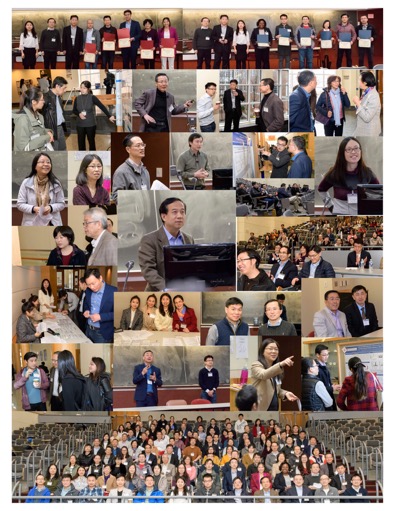News & Events
Meeting Report: The 2019 SCBA DC Baltimore Chapter Annual Scientific Symposium
Ji Luo, the SCBA DC-Baltimore Chapter 2019 President
The 2019 SCBA DC Baltimore Chapter Annual Symposium took place on Saturday, March 16th, 2019 on the campus of the University of Maryland at College Park. This was the first time this symposium took place on this campus. Over 120 registrants from research institutes and universities in the DC, Maryland and Virginia area attended the meeting. This record attendance was the highest ever since the inception of this Annual Symposium five years ago, and it demonstrated the strong interest among chapter members and local biomedical researchers for scientific exchange and networking.
The three scientific organizers of the sympoisum, Dr. Kai Ge (NIH), Dr. Ling Hao (NIH) and Dr. Hongbin Wang (UMD) put together a terrific scientific program that featured both research highlights form senior scientists as well as exciting breakthroughs from early-career PIs. The symposium was organized in three scientific sessions. The first session featured talks by Dr. Wei Li (NIH) and Dr. Liqing Yu (University of Maryland) on breakthroughs in metabolism and diseases. The second session featured talks by Dr. Rong Li (George Washington School of Medicine), Dr. Chunling Yi (Georgetown University) on recent advances in cancer research. The third session highlighted the works of young PIs who recently started their independent research group, these include Dr. Bin Wu (Johns Hopkins University of Medicine), Dr. Chongyi Chen (NIH) and Dr. Ying he (University of Maryland). Within each session, short talks were selected from abstract submissions to give outstanding postdoctoral fellows and staff scientists the spotlight to present their works.
The symposium featured a lively poster session with 30 posters presented by fellows and students. The exciting work by these trainees demonstrated a new generation of scientists that are pushing frontier of biomedical research using new and powerful technologies. After carefully review, a panel of judges selected six outstanding posters for excellence in research award.
To better cater to the needs of meeting attendees, the meeting organizers surveyed the attendees of the previous year’s symposium for feedback and suggestions on meeting contents. As a result, the organizers set up two parallel round table discussion groups during the network session of the meeting. One round table was hosted by Dr. Hongbin Wang and Dr. Laixi Wang (UMD) on the art of grant application. Senior PIs shared candid advice and personal experience based on their own successes and failures in grant application. The other round table was hosted by Dr. Frank Li and Dr. Dazhi Lai, two senior executives in the biopharmaceutical industry, on how to land a first job in industry. They shared valuable insights on what makes a job candidate’s case attractive to hiring managers and how to effectively network in an industry setting. Both round table sessions were extremely well received, and lively discussion continued all the way to the end of their allotted time.
Dr. Chen Dong, a renowned immunologist and the Dean of Tsinghua University School of Medicine, delivered the keynote speech at the symposium. Dr. Dong presented his group’s latest discoveries on the role of T-lymphocytes in inflammation and cancer, a topic that garnered great interest from the meeting attendees. The meeting was closed by president elect of the chapter, Dr. Yang Liu (University of Maryland), to great enthusiasm for next year’s Annual Symposium.
In addition to the scientific organizers, the success of this symposium was made possible by the tireless work of the chapter’s Executive Secretary Dr. Yufei Jiang, by strong support from the NIH Chinese Students and Scholar Association, and by chapter members and volunteers who generously donated their time and energy to make this symposium a memorable event.
